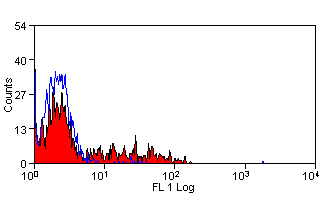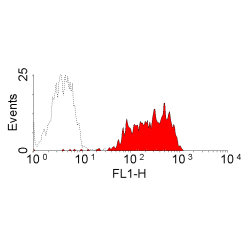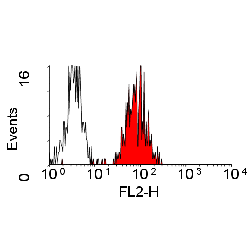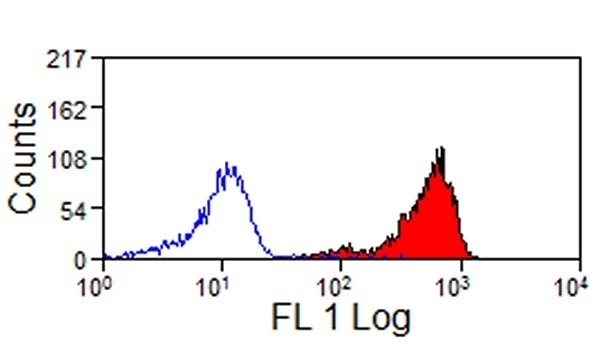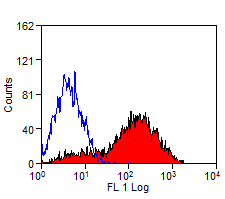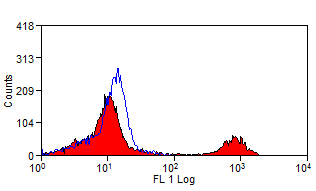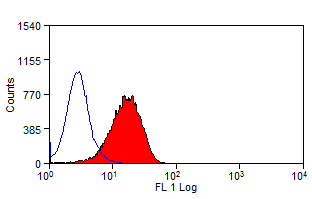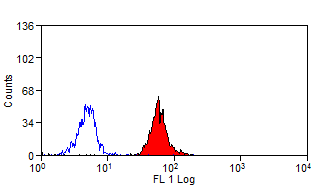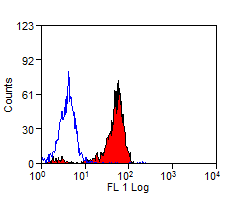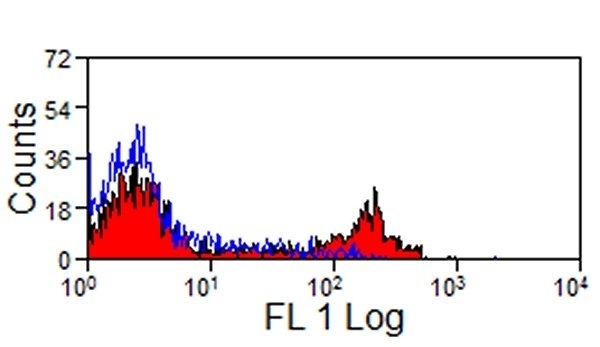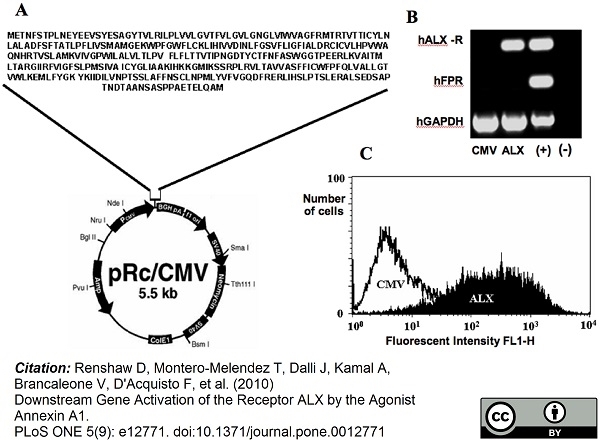IgG antibody











Rabbit F(ab')2 anti Mouse IgG:FITC
- Product Type
- Polyclonal Antibody
- Isotype
- Polyclonal IgG
- Specificity
- IgG
| FITC conjugated Rabbit F(ab')2 anti Mouse IgG antibody recognizes all subclasses of mouse IgG. Some cross reactivity with mouse IgM and IgA is expected, as is cross reactivity with rat IgG. Cross reactivity with human serum proteins has been minimised by solid phase adsorption. |
- Target Species
- Mouse
- Species Cross-Reactivity
-
Target Species Cross Reactivity Rat - N.B. Antibody reactivity and working conditions may vary between species.
- Product Form
- F(ab')2 fragment of IgG conjugated to Fluorescein Isothiocyanate Isomer I (FITC) - liquid
- Antiserum Preparation
- Antisera to Mouse IgG were raised by repeated immunisation of rabbits with highly purified antigen. Purified IgG was prepared from whole serum by affinity chromatography. F(ab')2 fragments were prepared by pepsin digestion of the IgG followed by a gel filtration step to remove the remaining intact IgG or Fc fragments.
- Buffer Solution
- Phosphate buffered saline
- Preservative Stabilisers
0.09% Sodium Azide - Immunogen
- Purified mouse IgG.
- Approx. Protein Concentrations
- F(ab')2 concentration 1.0 mg/ml
- Max Ex/Em
-
Fluorophore Excitation Max (nm) Emission Max (nm) FITC 490 525 - Regulatory
- For research purposes only
- Guarantee
- 12 months from date of despatch
Avoid repeated freezing and thawing as this may denature the antibody. Storage in frost-free freezers is not recommended. This product is photosensitive and should be protected from light.
| Application Name | Verified | Min Dilution | Max Dilution |
|---|---|---|---|
| Flow Cytometry | 1/25 | 1/100 |
- Flow Cytometry
- Use 50ul of the suggested working dilution to label 106 cells in 100ul.
References for IgG antibody
-
O-charoenrat, P. et al. (2000) Epidermal growth factor-like ligands differentially up-regulate matrix metalloproteinase 9 in head and neck squamous carcinoma cells.
Cancer Res. 60 (4): 1121-8. -
Lamote, I. et al. (2004) Influence of 17beta-estradiol, progesterone, and dexamethasone on diapedesis and viability of bovine blood polymorphonuclear leukocytes.
J Dairy Sci. 87 (10): 3340-9. -
Dalli, J. et al. (2008) Annexin 1 mediates the rapid anti-inflammatory effects of neutrophil-derived microparticles.
Blood. 112 (6): 2512-9. -
Fleming, E.H. et al. (2006) Respiratory syncytial virus F envelope protein associates with lipid rafts without a requirement for other virus proteins.
J Virol. 80: 12160-70. -
Peretti, M. et al. (2001) Expression of the three human major histocompatibility complex class II isotypes exhibits a differential dependence on the transcription factor RFXAP.
Mol Cell Biol. 21: 5699-709. -
Krawczyk, M. et al. (2005) New functions of the major histocompatibility complex class II-specific transcription factor RFXANK revealed by a high-resolution mutagenesis study.
Mol Cell Biol. 25: 8607-18. -
Frenzel, R. et al. (2006) The human thyrotropin receptor is predominantly internalized by beta-arrestin 2.
Endocrinology. 147: 3114-22. -
Brancaleone, V. et al. (2011) Evidence for an anti-inflammatory loop centered on polymorphonuclear leukocyte formyl peptide receptor 2/lipoxin A4 receptor and operative in the inflamed microvasculature.
J Immunol. 186: 4905-14.
View The Latest Product References
-
Waclavicek, M. et al. (2009) Analysis of the early response to TSST-1 reveals Vbeta-unrestricted extravasation, compartmentalization of the response, and unresponsiveness but not anergy to TSST-1.
J Leukoc Biol. 85: 44-54. -
Maderna, P. et al. (2010) FPR2/ALX receptor expression and internalization are critical for lipoxin A4 and annexin-derived peptide-stimulated phagocytosis.
FASEB J. 24: 4240-9. -
Ioannou, N. et al. (2011) Anti-tumour activity of afatinib, an irreversible ErbB family blocker, in human pancreatic tumour cells.
Br J Cancer. 105: 1554-62. -
Renshaw, D. et al. (2010) Downstream gene activation of the receptor ALX by the agonist annexin A1.
PLoS One. 5. pii: e12771. -
Bena, S. et al. (2012) Annexin A1 interaction with the FPR2/ALX receptor: identification of distinct domains and downstream associated signaling.
J Biol Chem. 287: 24690-7. -
Mehta, K. et al. (2016) Characterization of hepcidin response to holotransferrin in novel recombinant TfR1 HepG2 cells.
Blood Cells Mol Dis. 61: 37-45. -
Puvanenthiran, S. et al. (2016) Impact of the putative cancer stem cell markers and growth factor receptor expression on the sensitivity of ovarian cancer cells to treatment with various forms of small molecule tyrosine kinase inhibitors and cytotoxic drugs.
Int J Oncol. 49 (5): 1825-38. -
Ioannou, N. et al. (2013) Treatment with a combination of the ErbB (HER) family blocker afatinib and the IGF-IR inhibitor, NVP-AEW541 induces synergistic growth inhibition of human pancreatic cancer cells.
BMC Cancer. 13: 41. -
Khan, T. et al. (2020) Synergistic activity of agents targeting growth factor receptors, CDKs and downstream signaling molecules in a panel of pancreatic cancer cell lines and the identification of antagonistic combinations: Implications for future clinical trials in pancreatic cancer
Oncology Reports. 44 (6): 2581-94. -
Reitsma, L.M. et al. (2020) Effects of oral calcium bolus supplementation on intracellular polymorphonuclear leukocyte calcium levels and functionality in primiparous and multiparous dairy cows.
J Dairy Sci. 103 (12): 11876-88. -
Nadkarni, S. et al. (2019) Identification of an activated neutrophil phenotype in polymyalgia rheumatica during steroid treatment: a potential involvement of immune cell cross-talk.
Clin Sci (Lond). 133 (7): 839-851. -
da Silva, H.T. et al. (2021) Prophylactic use of an ultra-diluted complex on polymorphonuclear leukocyte function and respiratory scores of weaned Holstein calves immediately after grouping
Res Soc Dev. 10 (11): e281101119582. -
Lin, T.Y. et al. (2022) Radix Glycyrrhizae Preparata Induces Cell Cycle Arrest and Induced Caspase-Dependent Apoptosis in Glioblastoma Multiforme.
Neurol Int. 14 (4): 804-823. -
Hung, C.M. et al. (2023) Sulforaphane-Induced Cell Mitotic Delay and Inhibited Cell Proliferation via Regulating CDK5R1 Upregulation in Breast Cancer Cell Lines.
Biomedicines. 11 (4): 996. -
Al-Janaby, T. et al. (2024) The Combination of Afatinib With Dasatinib or Miransertib Results in Synergistic Growth Inhibition of Stomach Cancer Cells
World Journal of Oncology. 15 (2): 192-208.
- RRID
- AB_321920
- UniProt
- P01869
- P01865
- P03987
- P01864
- P01867
- P01868
- P01863
- Entrez Gene
- Igh-1a
- Igh-1a
- Igh-1a
- Ighg2b
- Ighg1
- Ighg1
- AI324046
- GO Terms
- GO:0003823 antigen binding
- GO:0002455 humoral immune response mediated by circulating immunoglobulin
- GO:0019731 antibacterial humoral response
- GO:0042571 immunoglobulin complex, circulating
- GO:0005886 plasma membrane
- GO:0016021 integral to membrane
- GO:0005576 extracellular region
- GO:0001788 antibody-dependent cellular cytotoxicity
- GO:0001798 positive regulation of type IIa hypersensitivity
- View More GO Terms
- GO:0001812 positive regulation of type I hypersensitivity
- GO:0006910 phagocytosis, recognition
- GO:0006911 phagocytosis, engulfment
- GO:0006958 complement activation, classical pathway
- GO:0050766 positive regulation of phagocytosis
STAR9B
If you cannot find the batch/lot you are looking for please contact our technical support team for assistance.
Please Note: All Products are "FOR RESEARCH PURPOSES ONLY"
View all Anti-Mouse ProductsAlways be the first to know.
When we launch new products and resources to help you achieve more in the lab.
Yes, sign me up